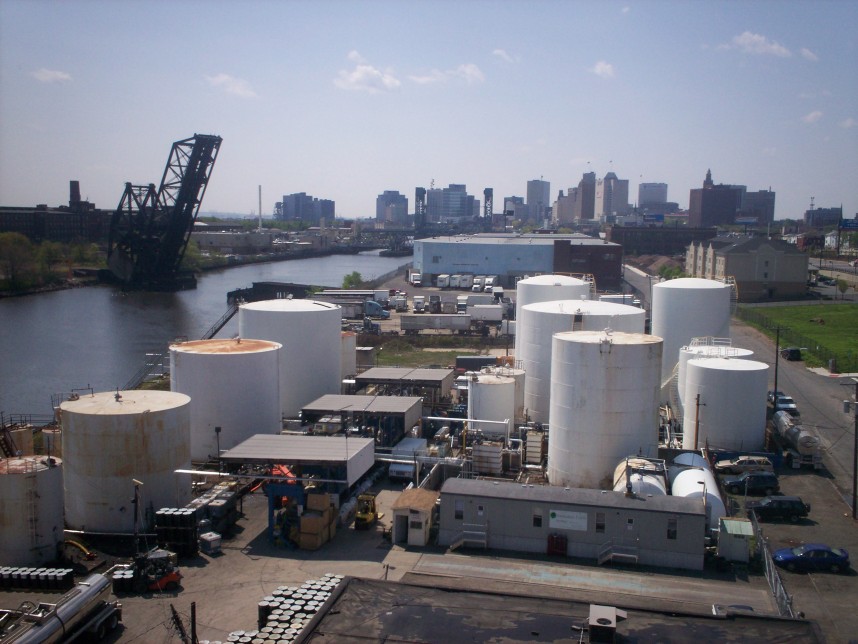Fill 'er up: biodiesel company in ship-shape for future

I recently spoke with the head of a biodiesel firm that's on the production side of the business. Innovaton Fuels was formed from the merger of smaller start-ups and already has one production plant in operation, and a second on the way. Based in Albany, Innovation just forged a financial and credit agreement with Citizens Financial Group, a New England bank. In turn it is owned by Royal Bank of Scotland, one of the world's largest.
The money matters here because Innovation is in the process of supplying biodiesel to large shippers and truck fleets. They need credit and they need to provide credit. A large tanker does not fill up with diesel using an American Express card. Innovation's located already in the Port of Newark, with their next plant planned for Milwaukee on Lake Michigan. You can bet they're paying attention to the Great Lakes water levels.
INNOVATION CEO
I spoke with Innovation Fuels' CEO, John Fox. He explained their business. The current plant in Newark produces 950,000 gallons BARRELS of biodiesel per year. It uses vegetable oils, fats, or greases, then reacts them with alcohol to produce a biodiesel fuel. That's sold to heating oil distributors, truck fleets and ships. Many ports, says Fox, are rerquiring ships to burn biodiesel while in the harbor. It burns much cleaner than the oil-based crud, not crude, they burn at sea. Using biodiesel reduces reduce emissions containing sulphur, particulate matter and hydrocarbons. A recent UN report called for an international effort to reduce ship fuel pollutants. The new Innovation plant in Milwaukee's port will produce 1.2 billion million gallons BARRELS a year. So Innovation is building in the right places at the right time.
RESEARCHING THE FUTURE OF BIODIESEL
Fox said Innovation's Research and Development center is studying next generation technology and feedstocks including jatropha and algae --both are crops that don’t divert resources away from feeding people. Fox said that 80% of their cost base is in raw material, so renewable, economical feedstock is a necessary part of their future planning.
Innovation has made investments in jatropha in India because it provides much higher yields than traditional sources like corn or rapeseed. Innovation's also looking at U.S. production from non-edible plants in mustard family. That means plants like pennycress and camolina that can be grown as intercrops with food plants. Tall rows of corn, with shorter camolina in-between: this double cropping would attract a lot of agricultural interest.
Innovation has a large pontential customer base in Europe already, but Fox explains it makes business sense to have refining capacity in the US where 25% of the global energy demand is. Fox said the only plans for additional diesel refining in America are for more biodiesel. No more petroleum-based refining capacity is expected. Later this year we'll see light-duty diesel vehicles (think pick-ups) on American roads. They will be fuel and emission efficient. Fox expects to see 3% or more annual growth of biodiesel use as a result.
Fox sees further consolidation in the biodiesel boiz. Demand will be great in US as mandates on air pollution take effect, i.e. renewable fuels standrards signed into law as part of Energy Act signed in 2007. Unless, Texas succeeds in getting them over-turned. I blogged about this corn vs. crude battle recently. Expect corn and biodiesel to win--it's an election year and the oil folks don't have a lot of political popularity right now.
Innovation is looking at eventually supplying a market of a billion gallons of biodiesel per year in the US alone. Already certain biodiesel use is required in states like Minnesota and New York. And Innovation, says Fox, will do it their way. He said they own a chemical process that cuts fatty acid content oils, lower grade, non-edible. Innovation has recipes using this wide variety of feedstocks including restaurant grease and fats. So all those French fries in Manhattan are gonna be powering trans-Atlantic ships. Innovation daily turns their feedstocks into methyl ester. And its some new jobs for old ports like Newark and Milwaukee.
